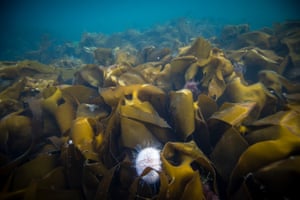More than 97% of British marine protected areas, created to safeguard ocean habitats, are being dredged and bottom trawled, according to data shared with the Guardian.
Nearly a quarter of the UK’s territorial waters are covered by MPAs, set up to protect vital ecosystems and species, including harbour porpoises and dolphins. This network of parks is a symbol of the government’s “world leading” target to protect 30% of ocean biodiversity by 2030.
However, analysis of fishing vessel tracking data from Global Fishing Watch (GFW), by Oceana, a conservation NGO, found that bottom trawling and dredging, the most destructive type of fishing on sea-floor habitats, is happening in 71 out of 73 offshore MPAs around the UK.
The vessels, from the UK, other EU countries and Russia, spent an estimated 200,000 hours trawling or dredging across the seabed in offshore MPAs in 2019, according to GFW algorithms based on their AIS (automatic identification systems) data, Oceana said.
The findings, which follow reports by Greenpeace of an increasing number of foreign supertrawlers fishing in the same sites, drew accusations that the government is misleading the public over “paper parks” that fail to protect Britain’s seas.
The government has insisted that the EU’s common fisheries policy restricts its ability to implement tougher protections in MPAs. Trawling and dredging is not illegal in most offshore MPAs.
Oceana warned of an “ecological emergency”, calling on the government to introduce measures to protect the sites from 1 January, the end of the Brexit transition period, when it gains more control of its territorial waters.
The shadow environment secretary, Luke Pollard, said the government should publish plans of how it intends to honour its “30 by 30” oceans pledge and hold urgent talks with fishermen.
Melissa Moore, head of policy at Oceana UK, said: “If the government really want to take back control of our waters, as they repeatedly claim, they should make a policy announcement today that they’ll halt bottom-towed fishing gear by foreign and UK vessels in all marine protected areas. We don’t want more trials, or other measures that merely rearrange the deckchairs, we’re in an ecological emergency and need action now.”
Prof Callum Roberts, a marine scientist at Exeter University, said it was “very disappointing” bottom trawling and dredging was still taking place inside protected sites.
Roberts said: “MPAs are highly ineffective. They are fake, they are paper parks. There’s a massive problem here and the government needs to address it. They are misleading the public, wasting resources, protecting nothing. They are not going to contribute to recovery of marine life, stem the loss of biodiversity or mitigate the impacts of climate change.”
After decades of industrial fishing which had destroyed seabed habitats, only a ban on fishing in MPAs would allow marine life to thrive, he said. “You can’t negotiate with marine life. It doesn’t work.”
Pollard praised the “30 by 30” pledge, which Michael Gove signed up to when environment secretary. “But that means ending fishing in MPAs. The government has not been honest enough with the fishing sector,” he said.
“There doesn’t seem to be a timetable, there doesn’t seem to be a plan and there doesn’t seem to be a conversation with the fishing sector about how we can work with fishers to incentivise fishing outside marine protected areas.
“Nine years is not very far away.”
Conservationists have recently stepped up lobbying to safeguard marine parks. In September, Greenpeace dropped giant boulders from its ship into the Dogger Bank MPA, a North Sea breeding ground for cod, whiting and sand eels, forcing trawlers to avoid the area or risk damaging their fishing gear.
The Blue Marine Foundation wrote to the fisheries minister, Victoria Prentis, to say it would seek a judicial review unless the government commits to protecting Dogger Bank and other MPAs. A number of NGOs, including WWF and the Marine Conservation Society, also accused the UK, the Netherlands and Germany of breaching the EU habitats directive by failing to protect Dogger Bank from bottom-impact fishing.

There are indications that the government is under pressure to restrict fishing in protected marine sites, although it has to balance the promises it has made to UK fishermen and allow some access to EU boats. Last week, Zac Goldsmith described supertrawlers as “gigantic tools of destruction” and hinted at a ban on industrial fishing inside protected areas.
In response to Oceana’s analysis, a Defra spokesperson said: “We are putting sustainable fishing and the protection of our seas at the heart of our future fishing strategy. We have already set up a ‘blue belt’ of protected waters nearly twice the size of England and the fisheries bill proposes new powers to better manage and control our marine protected areas.”
Leaving the EU and “taking back control of our waters” means the government can introduce stronger measures, they said.
A Scottish government spokesperson said: “Scotland’s marine protected area network is already in excess of 30% of our sea area – taking Scotland past the proposed new global target for 2030 currently being negotiated by the UN convention on biological diversity – and each site is managed to achieve its conservation objectives by restricting activity which will hinder this, while allowing sustainable use to continue.”